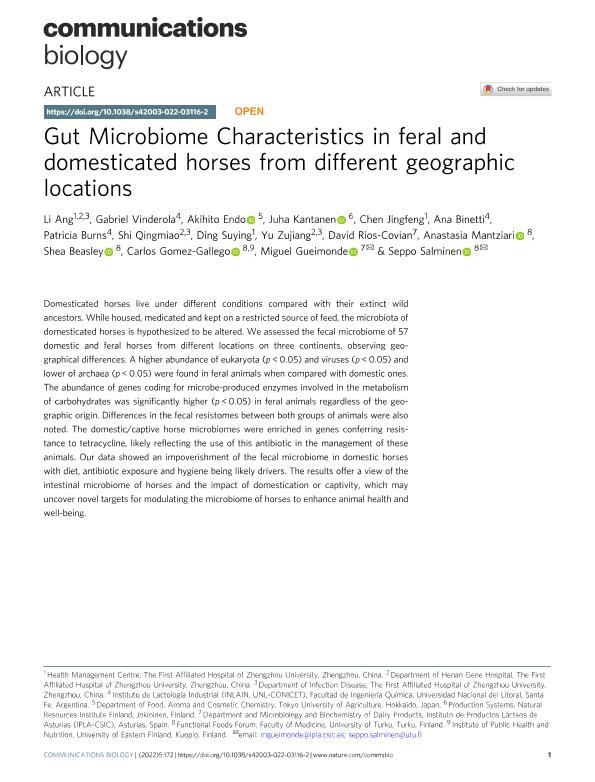Artículo
Gut Microbiome Characteristics in feral and domesticated horses from different geographic locations
Ang, Li; Vinderola, Celso Gabriel ; Endo, Akihito; Kantanen, Juha; Jingfeng, Chen; Binetti, Ana Griselda
; Endo, Akihito; Kantanen, Juha; Jingfeng, Chen; Binetti, Ana Griselda ; Burns, Patricia Graciela
; Burns, Patricia Graciela ; Qingmiao, S.; Suying, Ding; Zujiang, Yu; Rios Covian, David; Mantziari, Anastasia; Beasley, Shea; Gomez Gallego, Carlos; Gueimonde, Miguel; Salminen, Seppo
; Qingmiao, S.; Suying, Ding; Zujiang, Yu; Rios Covian, David; Mantziari, Anastasia; Beasley, Shea; Gomez Gallego, Carlos; Gueimonde, Miguel; Salminen, Seppo
 ; Endo, Akihito; Kantanen, Juha; Jingfeng, Chen; Binetti, Ana Griselda
; Endo, Akihito; Kantanen, Juha; Jingfeng, Chen; Binetti, Ana Griselda ; Burns, Patricia Graciela
; Burns, Patricia Graciela ; Qingmiao, S.; Suying, Ding; Zujiang, Yu; Rios Covian, David; Mantziari, Anastasia; Beasley, Shea; Gomez Gallego, Carlos; Gueimonde, Miguel; Salminen, Seppo
; Qingmiao, S.; Suying, Ding; Zujiang, Yu; Rios Covian, David; Mantziari, Anastasia; Beasley, Shea; Gomez Gallego, Carlos; Gueimonde, Miguel; Salminen, Seppo
Fecha de publicación:
02/2022
Editorial:
Springer
Revista:
Communications Biology
ISSN:
2399-3642
Idioma:
Inglés
Tipo de recurso:
Artículo publicado
Clasificación temática:
Resumen
Domesticated horses live under different conditions compared with their extinct wild ancestors. While housed, medicated and kept on a restricted source of feed, the microbiota of domesticated horses is hypothesized to be altered. We assessed the fecal microbiome of 57 domestic and feral horses from different locations on three continents, observing geographical differences. A higher abundance of eukaryota (p < 0.05) and viruses (p < 0.05) and lower of archaea (p < 0.05) were found in feral animals when compared with domestic ones. The abundance of genes coding for microbe-produced enzymes involved in the metabolism of carbohydrates was significantly higher (p < 0.05) in feral animals regardless of the geographic origin. Differences in the fecal resistomes between both groups of animals were also noted. The domestic/captive horse microbiomes were enriched in genes conferring resistance to tetracycline, likely reflecting the use of this antibiotic in the management of these animals. Our data showed an impoverishment of the fecal microbiome in domestic horses with diet, antibiotic exposure and hygiene being likely drivers. The results offer a view of the intestinal microbiome of horses and the impact of domestication or captivity, which may uncover novel targets for modulating the microbiome of horses to enhance animal health and well-being.
Palabras clave:
HORSE
,
MICROBIOME
,
DOMESTIC
,
WILD
,
FERAL
,
GLYCOSIDASES
,
ANTIBIOTIC RESISTANCE GENES
Archivos asociados
Licencia
Identificadores
Colecciones
Articulos(INLAIN)
Articulos de INST.DE LACTOLOGIA INDUSTRIAL
Articulos de INST.DE LACTOLOGIA INDUSTRIAL
Citación
Ang, Li; Vinderola, Celso Gabriel; Endo, Akihito; Kantanen, Juha; Jingfeng, Chen; et al.; Gut Microbiome Characteristics in feral and domesticated horses from different geographic locations; Springer; Communications Biology; 5; 1; 2-2022; 1-10
Compartir
Altmétricas



